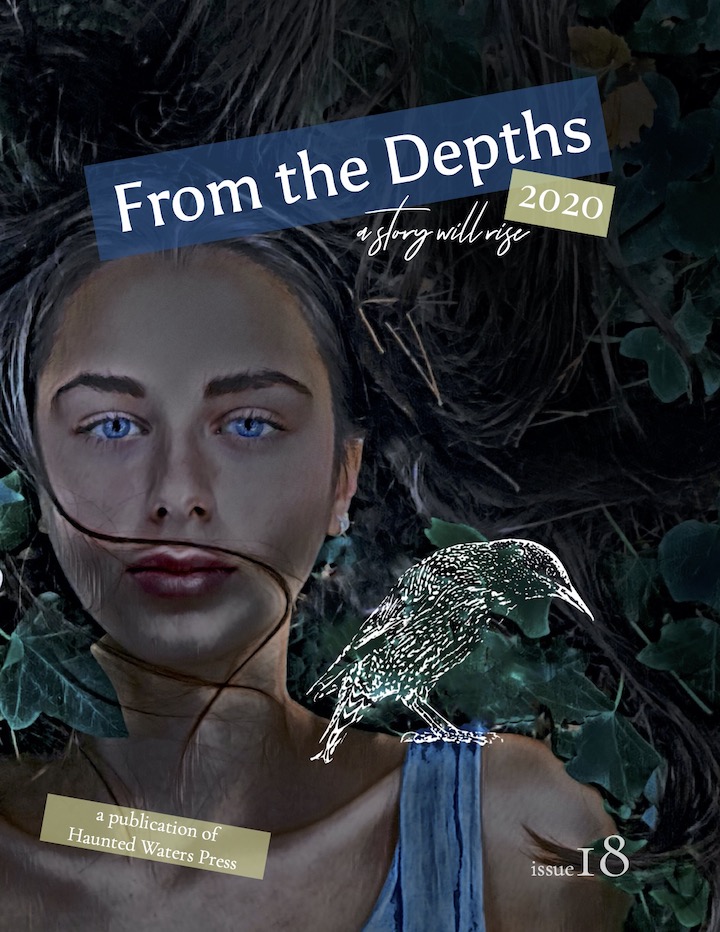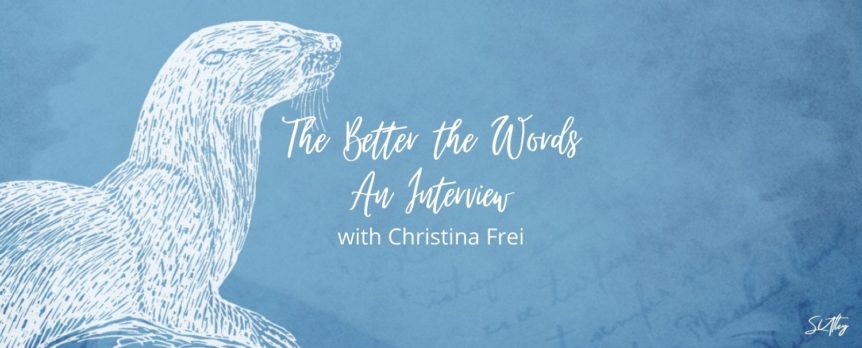Welcome! Today we chat with frequent HWP Contributor Christina Frei. Christina is the recipient of the 2020 Haunted Waters Press Award for Flash Fiction for her work Otters featured in the 2020 issue of From the Depths. Her work can also be found in the pages of SPLASH! Let’s dive in!
What first sparked your interest in writing?
I started writing in elementary school because I was such a bookworm. I had some great English teachers, also later in High School, who offered encouragement, for which I am grateful.
This is your second piece of flash fiction chosen for publication this year by HWP. What advice can you give other writers on writing effective and meaningful stories in under 500 words?
Both of those flash fiction pieces started out as poems. My poems are often narratives of some kind, so they can easily be ‘converted’ to fiction. But I think the same rule for poetry holds true for flash, that it comes down to finding exactly the right language: the better the words, the less physical space a story will need—if that makes sense.
You are also a talented poet. Are you drawn to one form over another? How do you decide if an experience or scene is meant for poetry or prose?
I am definitely drawn to poetry, but as I mentioned, most of my poems tend to be prose-y and are often more like miniature stories than the more abstract forms of poetry. Also, I think flash fiction is a close cousin to poetry, or like a hybrid between short fiction and poetry. Most experiences, I feel, could be told in either form.
I think flash fiction is a close cousin to poetry, or like a hybrid between short fiction and poetry. Most experiences, I feel, could be told in either form.
Let’s talk first drafts. Do you compose on a computer, or are you a pen and paper writer?
I would love to be able to say I write by candlelight while sipping absinthe, but I have to admit I do my composing mainly on the computer. I just find it easier to edit out the stuff that doesn’t work, so I don’t have to keep looking at it!
Do you ever give up on an idea? How do you know when a piece just isn’t working?
If a piece I’m working on starts to bore me, I usually scrap it. I love the phrase “re-arranging deck chairs on the Titanic,” so when it feels like that’s what I’m doing, it’s time to compost it.
What time of day can we find you writing?
I’m a night-time writer. But when my kids were younger, I was a grab-any-moment-at-any time-of-day writer. I conditioned myself to shut out the sounds of kids yelling. But generally, it just depends on what my schedule is like. I wish I was a morning person, but I’m not.
As a writer, do you find yourself constantly seeking inspiration in the world around you, or do you let the ideas come to you?
I usually let the ideas come to me. I draw inspiration from poets and poems I love, or sometimes just a word or a phrase I happen to read that triggers some kind of memory or emotional response.
We’re beginning to see stories and poetry come in that touch on feelings and experiences connected to this year’s pandemic. Did you find yourself exploring these themes in your own writing this year?
I have not written about the pandemic yet. It will probably come up in my writing once it’s all over. I find that life-changing events such as the current pandemic have to filter through me slowly so that I can process them properly. For instance, when we lived in Senegal, I didn’t write about those years until some time after we’d moved to Europe. It’s as if I needed that space to put those experiences into some context.
Is there an under-the-radar writer you wish more people knew about?
There are so many great poets who are under the radar their entire lives because poetry is still not valued as much as stories and novels. Dorian Brooks has published a collection of poetry called “The Wren’s Cry”. I find her poems mesmerizing.
What is the best piece of writing advice you’ve been given?
The best piece of writing advice I’ve been given is to lock up my inner editor during a first draft. Just write it as it comes to you. You can always fix it later.

I started writing in elementary school because I was such a bookworm. I had some great English teachers, also later in High School, who offered encouragement, for which I am grateful.
This is your second piece of flash fiction chosen for publication this year by HWP. What advice can you give other writers on writing effective and meaningful stories in under 500 words?
Both of those flash fiction pieces started out as poems. My poems are often narratives of some kind, so they can easily be ‘converted’ to fiction. But I think the same rule for poetry holds true for flash, that it comes down to finding exactly the right language: the better the words, the less physical space a story will need—if that makes sense.
You are also a talented poet. Are you drawn to one form over another? How do you decide if an experience or scene is meant for poetry or prose?
I am definitely drawn to poetry, but as I mentioned, most of my poems tend to be prose-y and are often more like miniature stories than the more abstract forms of poetry. Also, I think flash fiction is a close cousin to poetry, or like a hybrid between short fiction and poetry. Most experiences, I feel, could be told in either form.
I think flash fiction is a close cousin to poetry, or like a hybrid between short fiction and poetry. Most experiences, I feel, could be told in either form.
—Christina Frei
Let’s talk first drafts. Do you compose on a computer, or are you a pen and paper writer?
I would love to be able to say I write by candlelight while sipping absinthe, but I have to admit I do my composing mainly on the computer. I just find it easier to edit out the stuff that doesn’t work, so I don’t have to keep looking at it!
Do you ever give up on an idea? How do you know when a piece just isn’t working?
If a piece I’m working on starts to bore me, I usually scrap it. I love the phrase “re-arranging deck chairs on the Titanic,” so when it feels like that’s what I’m doing, it’s time to compost it.
What time of day can we find you writing?
I’m a night-time writer. But when my kids were younger, I was a grab-any-moment-at-any time-of-day writer. I conditioned myself to shut out the sounds of kids yelling. But generally, it just depends on what my schedule is like. I wish I was a morning person, but I’m not.
As a writer, do you find yourself constantly seeking inspiration in the world around you, or do you let the ideas come to you?
I usually let the ideas come to me. I draw inspiration from poets and poems I love, or sometimes just a word or a phrase I happen to read that triggers some kind of memory or emotional response.
We’re beginning to see stories and poetry come in that touch on feelings and experiences connected to this year’s pandemic. Did you find yourself exploring these themes in your own writing this year?
I have not written about the pandemic yet. It will probably come up in my writing once it’s all over. I find that life-changing events such as the current pandemic have to filter through me slowly so that I can process them properly. For instance, when we lived in Senegal, I didn’t write about those years until some time after we’d moved to Europe. It’s as if I needed that space to put those experiences into some context.
Is there an under-the-radar writer you wish more people knew about?
There are so many great poets who are under the radar their entire lives because poetry is still not valued as much as stories and novels. Dorian Brooks has published a collection of poetry called “The Wren’s Cry”. I find her poems mesmerizing.
What is the best piece of writing advice you’ve been given?
The best piece of writing advice I’ve been given is to lock up my inner editor during a first draft. Just write it as it comes to you. You can always fix it later.


Lightning Round with

ABOUT THE AUTHOR
Christina Frei grew up in Halifax, Nova Scotia and has lived in Toronto, Dakar, Amsterdam, and Montreal. Her poetry has appeared in numerous journals and she has been nominated for Best of the Net 2013, three Pushcart prizes, and a Best New Poets award.
Share this Post

